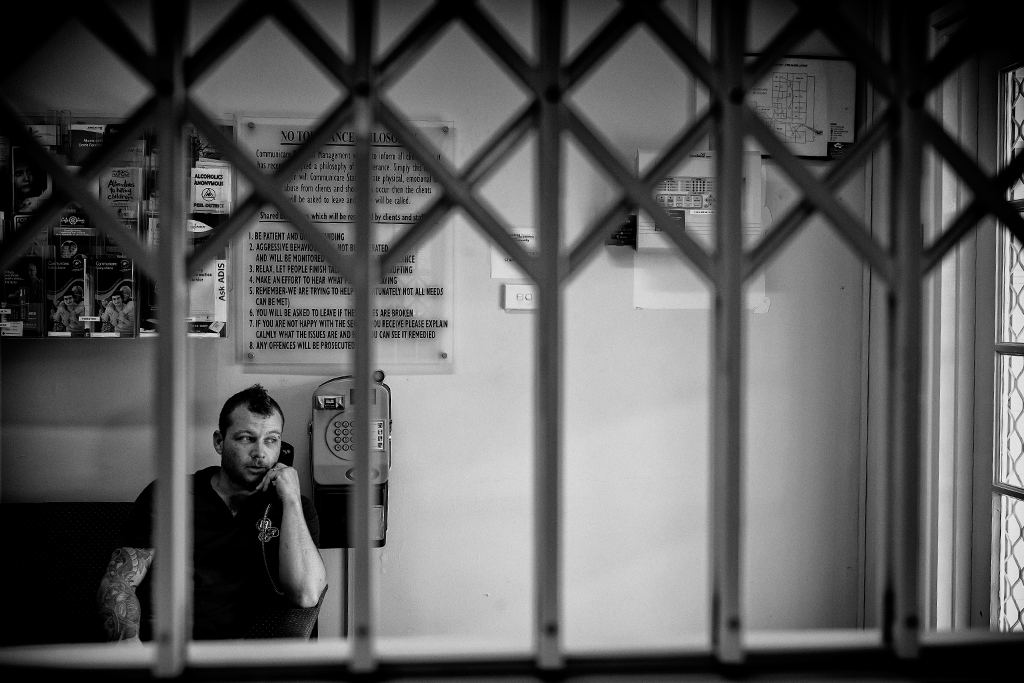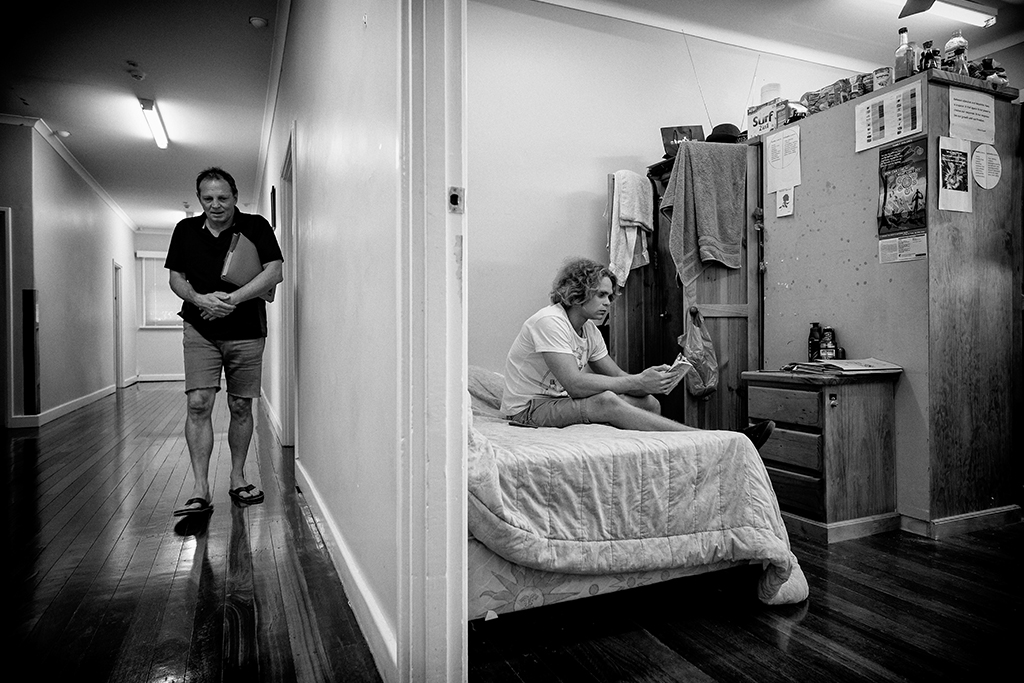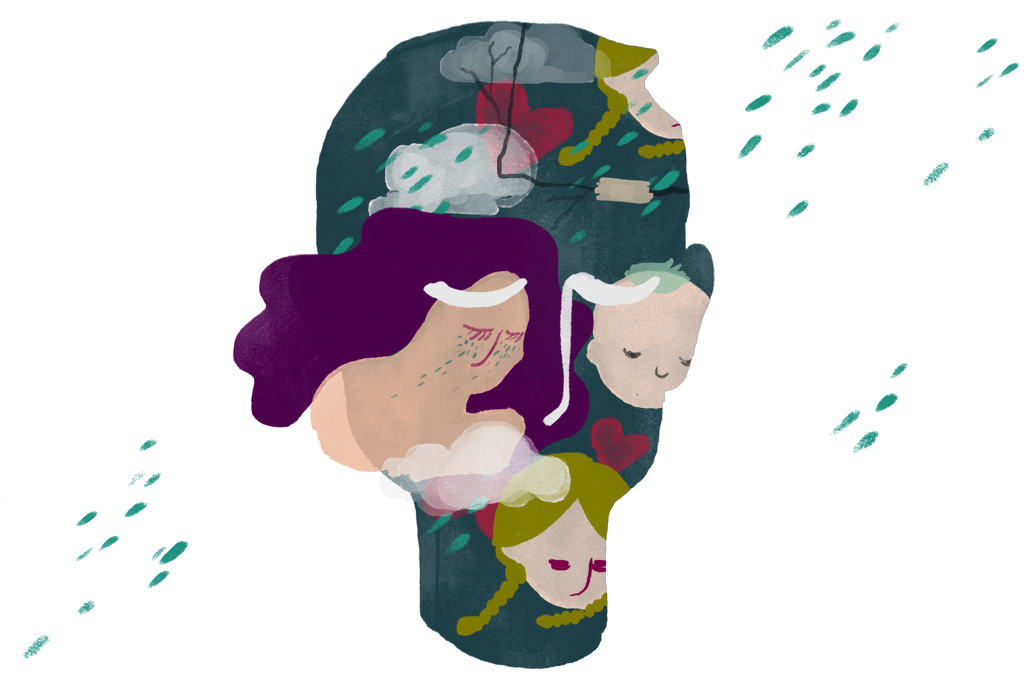How do you stop behaving abusively? For these men, confronting the damage they have done is just the start.
Billy is a mean bastard. He has a lot on his mind. He isn’t getting shifts. His missus is nagging him for petrol money. Didn’t he already give her some? Billy gets a beer, tries to relax, but she won’t let it rest. Won’t get off his back. So he stands over her. Holds her down. Yells in her scared little face. Grabs her skinny shoulders and squeezes, nice and hard. Eyes wild, he screams some more. Kicks her out and locks the door.
Billy is a mean bastard. He is also not real. Billy is a hypothetical case being discussed in group therapy by real men, who have found themselves in similar situations. The task before them – “mapping the incident” – is simple. Highlight the facts. Identify what Billy was thinking, then feeling, then what his partner felt. One by one, they say what went through Billy’s mind …
“Shut the fuck up,” offers Andrew.
“What’s she done with my money?” asks Aaron.
“She’s lying to me,” says Garry, nodding.
“How dare you?” says Allan, shaking his head.
The men know how Billy thinks. They’ve been there. They are domestic violence offenders but they want to change, so they’ve come here – to a facility unlike any other in Australia. They’ve come to Communicare Breathing Space, in suburban Perth, the only full-time residential men’s behaviour change program in the southern hemisphere.

Most programs aimed at correcting the behaviour of violent men are once a week, or ad hoc, often court ordered. But the men who come here do so voluntarily, committed to a three month stay that includes four hours of group therapy every day, along with case management and counselling – a 12-bed, 24-hour “therapeutic community”. They sometimes come wearing correctional anklets, or with bail conditions and restraining orders. But they also come of their own accord, referred by a community group or counsellor, often after a violent incident.
This group continues mapping the mind of Billy, during his imaginary outburst.
“Where do you think you’re going?”
“I’m not finished with you yet!”
“I’ll fucking hit you.”
One man sits in the corner, clearly not coping with the exercise. It’s Allan. He’s been here 10 days. Allan is 31, a father of four with a fifth on the way, and has used methamphetamine since he was 17. The incident that brought him here was fuelled by the drug. He has koi-pond sleeve tattoos, eyebrow rings and a green Mohawk. He calls himself The Hulk.
The Hulk is twitching, huffing through the nose, almost hyperventilating. Helen, the facilitator, tries to bring him out of his own head and back into the fold.
“Allan?” she says. “What was Billy thinking?” He looks up, panicked.
“I don’t know what I was thinking…” he says. “I mean, I don’t know what Billy was thinking. Is it all right if I be excused for a minute?”
Later Allan will admit the scenario was too close to his own past behaviour to discuss openly. Yet. Each man in the program will eventually be required to do exactly that – thoroughly examining the lead-up to and fallout from one of their worst offences. But learning to talk about their feelings is harder than it sounds. So hard that they need a “feelings chart” to pinpoint the right emotions.
Feeling sad? The chart offers 30 synonyms. Feeling angry? It suggests 23 different words you might use.
And so they run through the scenario, and this time they identify Billy’s emotions by the dozen. Frustrated and anxious. Then agitated and hostile. Perhaps depressed and hopeless? Certainly emasculated and inadequate.
“I reckon he’s furious,” says one.
“Definitely powerful,” says another.
“Victorious?
“Proud … ”
There’s silence as Allan taps the chart. “Was it just me, or did we go through every one of these emotions?” he says. “This is great. Can I get a copy of this?” And this is how their therapy begins. The men will eventually map out their own incident on butcher’s paper, circling every thought and feeling, every choice and action, every consequence – and carry them around in blue manila folders.
The place where they live is a weatherboard house among family homes, on a corner at the top of a hill, next to a few fig trees and gums. Inside the front door sits a rack of pamphlets with titles such as “Homeless?” and “Alternatives to Hitting Children”. On another wall is a chores roster so the men can take turns cleaning the kitchen, toilets, showers, hallways and commons areas. (Additional gardening and repairs to the property count towards community service.)
There are offices for case management where the handful of staff call potential clients. “It’s $134 a week,” a support worker says into the phone, “but we just take that out of your Centrelink payments.” “I understand,” says another. “And what are your parole conditions?”

The men sleep in six rooms, each with two single beds. They come and go freely from the house, to visit Centrelink and court, and, if they are still welcome, their families. Others are far from home and so they sit outside in the garden, dumping cigarette butts into empty coffee cans. They come from Karratha and Broome, Perth and the Pilbara, from Hakea Prison and Casuarina Prison. They arrive often in desperation, with a quiet anxiety, and sometimes with no voice at all – hoarse from screaming at their terrified partner.
Allan came here in early November. On his birthday. Suicidal, yet discharged from the local mental health unit in Joondalup, he came directly from the beach where he had been sleeping in his car for more than a week. “I got here and I just sat out the front in my car for 15 minutes, and I cried and I cried and I cried,” he says. “Not because I was sad, but because I was finally here.” He was scared. And the program is confronting. Residents often start out harbouring blame towards other people, drugs, alcohol, difficult situations and uncontrollable anger.
They minimise. “A lot of the other blokes in here have much worser stories than me,” says an Indigenous man, who fought repeatedly with his wife in front of his two sons. “Mine isn’t so bad. Makes me think my problem isn’t so much.” They justify. “You can’t make excuses, bro,” says one articulate young guy. “But my missus was eight months pregnant and she was drinking. She was drunk with my baby! So I flogged her.” And they delay and obfuscate by way of elaborate back stories. Allan does this.
Ask him how he came to be here and he mentions suicide attempts, grandparents sick of his antics, mental health units, ice keeping him awake for three weeks at a time, and how that must have scared his little boys. Until prompted, he does not mention assaulting his partner. Until pressed for detail, he doesn’t mention threatening her with his baseball bat. Or a knife. Or that he took a wire brush to her mouth, for “talking shit”. That when she ran outside holding a family portrait – to show him what his rampage was ruining – he smashed it over her head, and kicked her when she hit the ground.
Once the facts come up, the hard work begins. The support workers are there to help and each has their own style.
Helen is firm but funny. Bruce is philosophical. James questions and clarifies. Ben calls himself a “world changer” because of the progress he sees. “Looking at the past to make a future different is a hard thing to do,” he says. “Not many people want to talk about the past. It brings up a lot of shame.” Most men focus on their anger – as if rage were responsible for their decision to bully and hit. So the program centres on creating a gap – a crucial pause – between the emotion (anger) and the action (aggression). They use “thought logs” to sketch how the mind processes stress. They identify whether you are a “black/white thinker” or “should/ought thinker”, whether they “personalise” or “catastrophise”. They rake over every destructive habit but keep returning to a central idea: domestic violence is a decision. You did not just “snap”. You chose.
Their emotional intelligence is generally low. In a group discussion of “values”, for instance, their ignorance is almost heartbreaking. Helen asks what values are, and the guys simply don’t know. Well, they’re something that’s important to you, says Helen. “My driver’s licence is important to me,” says one in earnest. More like something that helps you understand the world. “Like Google?” They’re something you cherish. “I cherish my kids.”
Eventually Helen spells out the concept by offering concrete examples. Friendship. Honesty. Love. Kindness. Integrity. The men don’t know what integrity means.
“I love integrity,” says Helen, beaming. “I think it’s fundamental to us as human beings. It’s about living our values even when no one is watching. Only you can lose your integrity.”
“That’s a powerful word,” says one man. “That might be my next tattoo.”
“True, bro,” says Allan. “Like, I like to get respect, but I show disrespect and shit-stir. So there’s my integrity gone.”
Everything they do in therapy is broken down in this way – simplified in order to make it stick. The guys love analogies and metaphors and inspirational quotes. The walls are lined with them, printed on A4 paper… It is better to walk alone than with a crowd in the wrong direction. You can’t change what you refuse to confront. You never fail until you stop trying.
They also find their own ways to describe the program. A gym rat loves the idea of therapy as mental exercise: “That’s why we’re here, man. To train our brains to get fit and healthy.” A gear head likens negative thoughts to cars on a freeway (“You don’t have to jump in every one and go for a ride”) and negative actions to four-wheel driving (“You take the same tracks over and over again, and fall into the same ruts”).
They also develop life skills. There’s a parenting class called Dadworks, and a cooking class, Foodcents, where they make cheap and nutritional meals. Today it’s Moroccan pizza. Allan kneads yoghurt and self-raising flour into stretchy dough. Cliff cuts mushrooms and capsicum. Aaron peels and crushes garlic. Garry does dishes and changes the bin bags. They laugh and fist bump every little job well done. Pumpkin roasted? Fist bump. Hummus mixed? Fist bump. Feta crumbled? Fist bump. While the crust firms, they have a smoko outside on the concrete landing, then head back in to add olives, cheese, vegies and meat to each base.
“Look at ’em,” says Andrew, smiling at six pizzas. “All different shapes, sizes and colours. Like us, eh?”
Every man here has a sad story. Baby-faced Kane, a graffiti artist and drug user, was sent to prison when he was just 18, for burglary and aggravated assault. Cliff, a Ngaanyatjarra man from the remote Warburton Community in the Gibson Desert, has a drinking problem and a three-year-old daughter with leukaemia. Middle-aged Garry is the handyman of the house, who last night found a baby bird, named it Tweety, gave it water and strawberry jam, and watched it die. But ultimately the program is not about them. The program is about the women and children they have terrorised.

Men’s behaviour change programs are quite common now but they weren’t always. Certainly not when this facility was launched 12 years ago. Perpetrator response was then seen by the sector as innovative and unusual at best – a fundamental misdirection of resources at worst.
Melissa Perry, CEO of the organisation, says prioritising women and children (shelters, refuges, outreach) over less popular offender therapy programs makes perfect sense, but the two are not mutually exclusive. Communicare Breathing Space allows men to leave the family home – not women and children. The women are also kept appraised of their partner’s movements while the men no longer float aimlessly in such a charged and dangerous time. “There’s a lot of research to suggest that men who become homeless through family and domestic violence actually puts women and children at more risk,” says Perry. “Women consistently tell us that they feel much safer knowing where their men are.”
A “transition in” unit helps stabilise men with untreated mental illness and substance issues until ready to begin the course, and a “transition out” program gives them somewhere to stay while they get back on their feet. Recidivism can’t be measured without an extensive longitudinal study in co-operation with police, but more than 850 men have come through the program over 12 years, and the completion rate is one in three – far better than the one in four average of most other programs.
Family violence campaigner Rosie Batty has pledged to visit the Perth facility in early 2016, to see what it can offer the rest of the country. And Perry is spreading the gospel, having written to every premier. “We would really like to see a Breathing Space in every single state within three years,” she says. “That’s our aim.” The true cost is around $700,000 per year, funded in Western Australia mostly by the Department for Child Protection and Family Support. Compared to the cost of incarcerating a single man for one year – around $280,000 – the $15,000 required for each man to experience the program is minor.
“We haven’t been able to talk about perpetrator response until now,” says Perry, “but I think we’re ready. It does work.” But it is also hard work. Michael can attest to that. He arrived at the facility as “a little ball of testosterone” and is now in the transition out unit, having finished the program four months ago.
The therapy was daunting at first, he says, yet nothing compared to the unvarnished introspection demanded later on. Twice he came close to quitting. “But it was pretty cathartic,” he says. “I’ve come out a different person.” Allan is hoping for the same experience. He presents as bubbly, but is also capable of deep swings into darkness. He is enthusiastic in his approach, but is he sincere? The roughest patch will come at Christmas. Allan plans to stay at the facility instead of going home. The men can apply for weekend leave to visit their family. And most do.
“I don’t,” he says. “I’ve got my car outside, but I’ve got my heart set on staying here for the full three months. I’m sick and tired of saying ‘I’m sorry, I’ll change’, making promises and not keeping them. I don’t want that.”
He is committed to cleaning up his act, manning up and moving home. His family have seen enough of The Hulk. “You’ve seen the worst, now you’re going to see the best,” he says. “I’m going to show you how you treat a woman, how to be a dad. I’m going to show you all the good things in life. I’m not going to stop.”
This story first appeared in The Age on December 13, 2015. (Sadly, Allan left the Breathing Space program shortly thereafter.)



